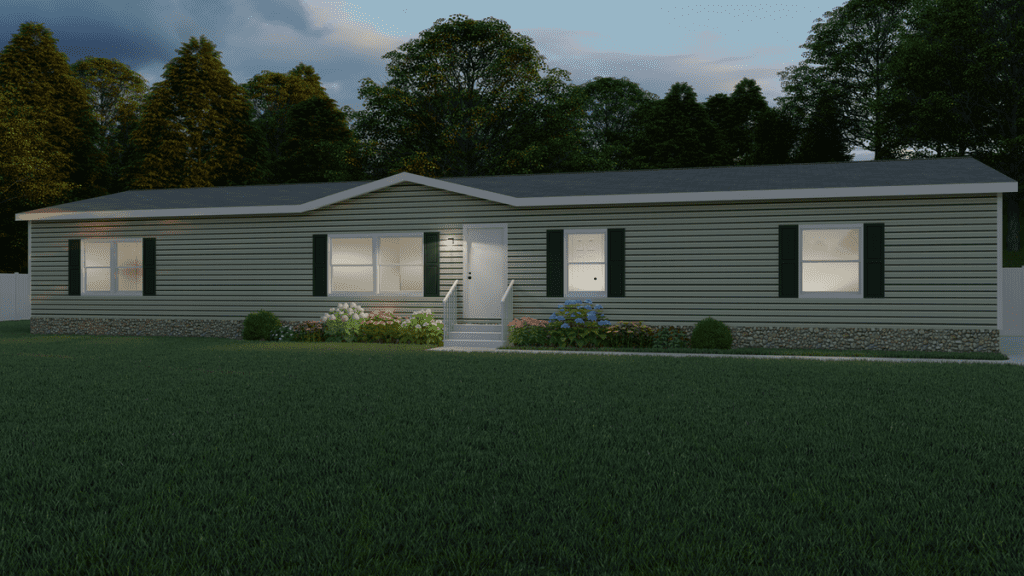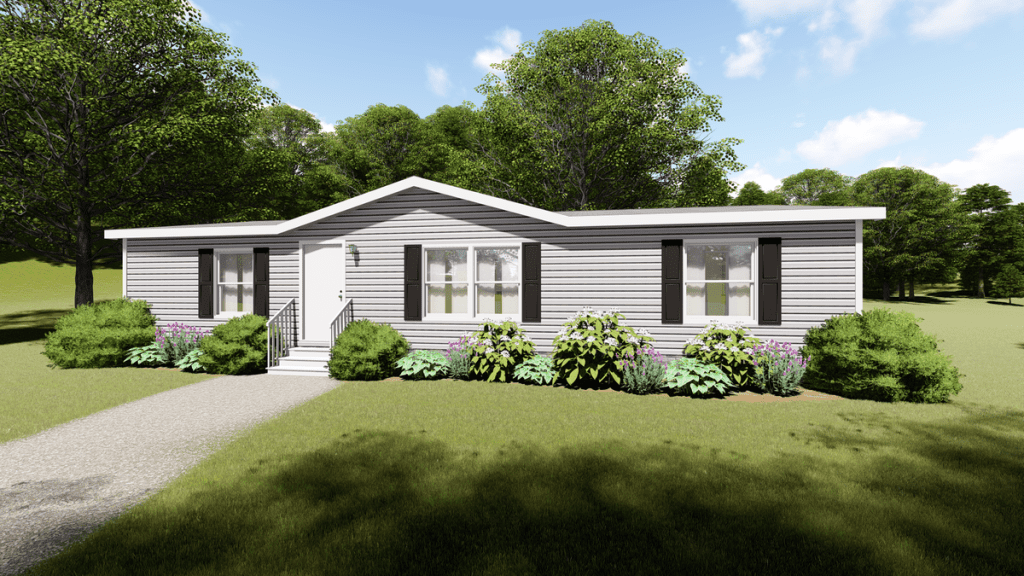When buying a manufactured home, it’s crucial to consider not only the price of the home itself but also the additional costs that include delivery and setup. These expenses can significantly impact your overall budget, so it’s essential to factor them in before making a final decision for your new manufactured and modular home.
Additional Costs Beyond the Home Price
In addition to the cost to build the new manufactured home, you may encounter various fees that include the cost of delivery and the installation process on the home site. Setting up your mobile home can include:
- transportation costs,
- permit fees,
- site preparation expenses,
- utility hookups,
- and potential foundation costs.
Depending on the location, it’s advisable to consult with a qualified professional in the manufactured home community to get an accurate estimate of these additional costs.
Key Factors Influencing Manufactured Home Delivery Costs

This section should break down the various components that contribute to the delivery cost.
Distance from the Manufacturing Facility
One of the primary factors influencing manufactured home delivery costs is the distance between the manufacturing facility and the destination site. The further the distance, the higher the transportation costs.
Transportation companies often charge per mile, with the cost per mile varying depending on factors such as fuel prices, road conditions, and the weight of the home. Additionally, certain regions may have specific regulations or fees that can impact the overall delivery cost. For instance, some states or provinces may require special permits or escorts for oversized loads, which can add to the expense.
Size and Type of Manufactured Home
The size and type of manufactured home significantly impact delivery costs. Larger homes or those consisting of multiple sections often necessitate specialized transportation equipment, such as oversized trucks or multiple trailers. This can increase the overall cost of transportation, as specialized equipment and drivers are typically more expensive.
Additionally, the complexity of the home’s design and construction can influence delivery costs. Homes with unique features or intricate layouts may require additional handling and care during transportation, which can also contribute to higher expenses.
Route Accessibility and Permits
The accessibility of the delivery route plays a crucial role in determining the cost of transporting a manufactured home. Narrow roads, low bridges, or routes through densely populated urban areas can pose challenges and increase the complexity of the delivery process. In such cases, specialized transport equipment and experienced drivers may be required to navigate the route safely.
Moreover, oversized manufactured homes often require special permits to be transported on public roads. These permits may involve fees and additional regulations, such as specific travel times or route restrictions. Failure to obtain the necessary permits can result in delays and penalties, further impacting the overall delivery cost.
What’s Included in Your Manufactured Home Delivery and Set Up Package?
Typical Services Included in Manufactured Home Delivery and Set Up Packages:
- Transportation: Safe and efficient transport of the home from the manufacturing facility to your designated site.
- Site Preparation: Leveling the ground and ensuring proper drainage to create a stable foundation for the home.
- Foundation Installation: Depending on local regulations and soil conditions, this may involve installing a permanent foundation or using a temporary setup.
- Home Assembly: Assembling the various sections of the home, connecting them securely, and sealing any gaps.
- Utility Hookups: Connecting the home to essential utilities such as water, electricity, and gas.
- Interior and Exterior Inspections: Thoroughly inspecting the home’s interior and exterior for any damage or defects that may have occurred during transportation or assembly.
- Final Walk-Through: A final inspection with the homeowner to ensure that everything is in working order and to address any final concerns or questions.
Please note that the specific services included in a delivery and setup package may vary depending on the manufacturer, the complexity of the home, and local regulations. It’s essential to carefully review the terms of your contract to understand exactly what is covered.
Typical Costs for Setting Up a Manufactured Home
Once a manufactured home arrives at its destination, the setup process begins. This involves several steps, each with associated costs.
Foundation Preparation
One of the first steps in setting up a manufactured home is preparing the foundation. The type of foundation required will depend on local building codes, soil conditions, and the specific requirements of the home. Common foundation options include:
- Slab Foundation: A concrete slab poured directly onto the ground. This is a popular choice for its simplicity and durability. However, it can be more expensive, especially in areas with challenging soil conditions.
- Pier and Beam Foundation: This involves installing concrete piers into the ground and supporting the home on wooden beams. This option is often more affordable than a slab foundation and can be a good choice for areas with sloping terrain or poor soil.
- Crawl Space Foundation: This type of foundation creates a crawl space beneath the home, providing access for plumbing and electrical work. While it can be more expensive to build, it can also offer additional storage space.
The cost of foundation preparation can vary significantly depending on the size of the home, the type of foundation, and local labor and material costs.
Additional Setup Costs
In addition to foundation preparation, other mobile home costs may include:
- Site Preparation: Leveling the ground and removing any obstacles.
- Utility Hookups: Connecting the home to water, sewer, and electrical services.
- Framing and Siding: Adding any necessary framing or siding to the home.
- Insulation and Drywall: Installing insulation and drywall to improve energy efficiency and interior finish.
- Floor Plan and Cabinetry: Installing flooring, cabinets, and countertops.
- Plumbing and Electrical Work: Completing the plumbing and electrical systems.
- HVAC Installation: Installing heating and cooling systems.
It’s important to note that these costs can vary widely depending on the specific needs and the complexity of the manufactured home installation. It’s advisable to consult with a qualified contractor to get an accurate estimate of the total cost of setting up a manufactured home.
Utility Connections (Water, Electricity, Sewage)
A mobile home installation connects it to essential utilities like water, electricity, and sewage. The installation cost of these connections can vary significantly depending on several factors, including:
- Distance to Utility Lines: The further the home is from existing utility lines, the higher the cost of running new lines.
- Local Regulations and Permits: Different regions may have specific regulations and permit fees associated with utility connections.
- Complexity of the Installation: The complexity of the installation, such as the need for specialized equipment or techniques, can also impact the cost.
Typical Utility Connection Costs
While it’s difficult to provide exact figures, here’s a general overview of the potential costs involved:
- Water Connection: This typically involves digging a trench to connect the home to the water main. The cost can range from a few hundred to several thousand dollars, depending on the distance and the complexity of the installation.
- Sewer Connection: Similar to water connections, sewer connections involve digging a trench to connect the home to the sewer line. The cost can vary significantly, especially if a septic system is required.
- Electrical Connection: This involves running electrical lines from the utility pole to the home. The cost can range from a few hundred to several thousand dollars, depending on the distance and the size of the electrical service required.
It’s important to consult with local utility providers and contractors to get accurate estimates for your specific situation. By carefully considering these factors, you can better budget for the utility connection costs when setting up your manufactured home.
Final Inspections and Certifications
Before a manufactured home may be occupied, it must undergo final inspections and certifications to ensure it meets local building codes and safety standards. These inspections are typically conducted by local building inspectors or third-party certified inspectors.
Common Inspection Areas:
- Structural Integrity: Ensuring the home’s frame, walls, and roof are sound and stable.
- Electrical Systems: Verifying that the electrical wiring, outlets, and panel are properly installed and meet safety standards.
- Plumbing System: Checking the plumbing system for leaks, proper installation, and compliance with local codes.
- Heating and Cooling Systems: Inspecting the HVAC system to ensure it operates efficiently and safely.
- Fire Safety Equipment: Confirming the presence and proper installation of smoke detectors and carbon monoxide detectors.
- Insulation and Ventilation: Verifying that the home is adequately insulated and ventilated to maintain comfortable living conditions and energy efficiency.
Inspection Fees:
The cost of inspections can vary depending on local regulations, the size of the home, and the specific requirements of the inspection. However, it’s reasonable to expect to pay a few hundred dollars for a comprehensive inspection.
By ensuring that your manufactured home passes all necessary inspections and certifications, you can have peace of mind knowing that your home is safe, compliant, and ready for occupancy.
Hidden Fees That Could Surprise You

When considering the total manufactured home cost, it’s crucial to be aware of potential hidden fees that could arise during the delivery and setup process. One often-overlooked expense is insurance. Securing adequate insurance coverage during transportation is essential to protect against unforeseen events like accidents or natural disasters that could damage the home.
Additionally, understanding the potential impact of local regulations and zoning laws is vital. Obtaining necessary permits and inspections can add significant costs, ranging from a few hundred to a thousand dollars or more. Furthermore, zoning restrictions may limit the placement of manufactured homes in certain areas, potentially increasing the cost of finding a suitable lot or requiring additional modifications to the home.
Finally, it’s worth noting that the value of a manufactured home can fluctuate over time, influenced by factors like market demand and economic conditions. While this may not directly impact the initial purchase and setup home costs, it’s important to consider the potential long-term financial implications of owning a modular home.
Avoiding Common Pitfalls During Manufactured Home Delivery and Setup
One common pitfall buyers make is underestimating the total cost of a manufactured home. It’s essential to consider not only the purchase price but also the additional expenses associated with delivery, setup, and site preparation. To avoid surprises, thoroughly research local regulations, permit fees, and potential utility connection costs. Additionally, it’s wise to consult with a qualified contractor to get an accurate estimate of the total expenses involved.
Another mistake buyers often make is failing to adequately plan for the delivery and setup process. It’s important to coordinate with the manufacturer and transportation company to schedule the delivery and ensure that the site is properly prepared. Additionally, it’s crucial to have all necessary permits and approvals in place before the home arrives. By carefully planning and addressing these potential issues, buyers can significantly reduce the stress and complexity of the delivery and setup process.
Frequently Asked Questions on Manufactured Home Delivery and Set Up
What should I expect to pay for delivery in my area?
The cost of delivering a modular home depends on several factors, including distance, size, weight, road conditions, fuel prices, and local permits. To get an accurate estimate for your location, consult a local dealer or transportation company.
How long does the delivery and setup process typically take?
The duration of the delivery and setup process for a manufactured home can vary widely. Factors like distance, road conditions, site preparation, home size, local regulations, and weather can all influence the timeline. Generally, the entire process can take several weeks to a few months. For a more accurate estimate, consult with your dealer and transportation company.
Can I finance delivery and setup costs along with my mobile home purchase?
Yes, you can often finance delivery and setup costs along with your manufactured home purchase. Many lenders offer financing options that cover the total cost of the home, including transportation, setup, and even site preparation.
When exploring financing options, it’s important to compare interest rates, terms, and any additional fees associated with the loan.
Be sure to discuss your specific needs and budget with a lender to find the best financing solution for your situation.
Get Your Mobile Home with Manufactured Housing Consultants in Laredo
Ready to find your dream manufactured home? Manufactured Housing Consultants in Laredo offers a wide range of affordable and high-quality mobile homes. Our team of experts can help you understand the total cost of ownership and guide you through the entire process, from choosing the perfect home to securing financing and handling delivery and setup.
Contact us today to explore our current listings of mobile homes for sale and start your journey to homeownership!


